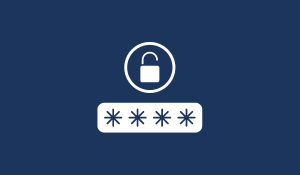Secure passwords 101: 14 tips and tricks for robust protection
Digital life is now inseparable from daily life. We manage our finances, communicate with loved ones, and store sensitive information all online. But...
7 min read
 DriveLock
Oct 10, 2024 10:45:00 AM
DriveLock
Oct 10, 2024 10:45:00 AM

In the digital business world, where the number of online accounts and IT systems used is constantly growing, the protection of sensitive information is becoming increasingly important. Companies are faced with the challenge of securely managing countless passwords to protect their data from cyberattacks and unauthorized access.
| CONTENT |
A password manager offers an efficient solution to increase security while reducing the administrative burden. In this article, you will learn how the use of password managers in companies not only improves the protection of sensitive data, but also makes employees' day-to-day work easier.
A password manager is a software application that is used to securely store, organize and manage passwords. Instead of having to remember multiple passwords for different accounts, users can use one main password to access their password manager. This then saves all other passwords and can automatically insert them into login forms. A password manager helps to increase security as it can generate complex and unique passwords for different accounts.
Local password manager: These store all passwords locally on the user's device. Examples are programmes that are installed on the computer or smartphone. The advantages are that the passwords are only stored on the user's own device and the user has full control over them.
Cloud-based password manager: These store the passwords in the cloud so that the user can access their passwords from different devices. This type of password manager enables synchronisation between multiple devices. Some well-known examples are LastPass, 1Password and Dashlane.
Browser-based password manager: These are integrated into web browsers and save passwords directly in the browser. They often offer a simple solution for storing and retrieving passwords, but are sometimes less secure than specialised password managers.
Hardware-based password manager: They use a physical device to store and manage passwords. Such devices are particularly secure as they work offline and cannot be hacked so easily.
A password manager therefore provides a secure and convenient solution for managing many login credentials and helps to reduce the risk of weak or reused passwords.
There are several password managers that are particularly well suited for use in businesses. Among the best known are LastPass, Dashlane, 1Password and Keeper. These tools offer special features for businesses, such as user rights management, integration with existing IT systems and compliance with security policies.
These password managers also provide detailed reports and analytics that help IT administrators monitor password security within the organisation and identify vulnerabilities. In addition, they often offer excellent customer support and training materials to help employees learn how to use the password manager.
A password manager has numerous benefits for companies, especially in terms of security, efficiency and credential management. Here are some of the key benefits of a password manager for businesses:
Improved security
The password manager generates strong, unique passwords for each account used by employees. This minimizes the risk of multiple accounts being compromised by the same or weak passwords. The password manager also encrypts passwords and stores them securely, significantly reducing the risk of unauthorized access.
Central administration
In a company, the administrator can use a password manager to maintain centralized control over all employee passwords. Administrators can enforce password policies, such as password length and complexity, and have the ability to change passwords or revoke access as needed.
Access control and authorizations
The password manager enables companies to control access to certain systems or data. Companies can provide employees with only the passwords and access data to the applications that they need for their work. If necessary, these rights can be adjusted or withdrawn at any time.
Time savings and efficiency
A password manager automates the login process by automatically inserting usernames and passwords into login fields. This saves time as employees do not have to constantly search for or remember passwords. In addition, employees can quickly generate new, secure passwords without having to remember them.
Protection against phishing and data theft
The password manager checks the authenticity of websites before automatically entering login data. This protects companies from their employees falling for fake phishing websites and disclosing confidential information. As passwords do not have to be entered manually, the risk of keyloggers or other malware is also reduced.
Audit and monitoring functions
With a password manager, companies can track who has accessed which accounts and when. This provides greater transparency and enables the company to detect security breaches or unauthorized access at an early stage. The password manager 's logs provide valuable information for audits and compliance regulations.
Secure sharing of passwords
Password Manager allows organizations to securely share passwords among employees without the need to transmit them via insecure channels such as email or text messages. This is particularly useful when multiple employees need to access the same systems or platforms.
Scalability
Whether a company is growing or changing staff, a password manager makes it easier to manage access. New employees can quickly and securely gain access to the passwords they need, while former employees can be easily removed from the system.
While enterprise password managers offer crucial benefits for security and efficiency, their successful deployment across companies and public institutions is often complicated by several significant challenges that require careful planning.
Master Password Risk and Recovery
The centralized nature of a password manager creates a single point of failure: the Master Password. This one credential controls access to all other stored passwords.
Access Loss: If an employee loses or forgets their Master Password, the consequences can be severe. Regaining access to critical credentials can be difficult and extremely time-consuming. This challenge is analogous to managing essential backup keys for hardware, such as the BitLocker recovery key used for encrypted drives; if that key is lost, the data is essentially inaccessible.
Administrative Burden: For public organizations handling sensitive data, the process of secure recovery is a considerable administrative and security challenge, potentially locking out users from essential systems. This highlights a foundational weakness that passwordless authentication (which eliminates the need for any high-value master password) is designed to solve.
User Adoption and Training Hurdles
User acceptance and training remain one of the biggest initial barriers. Employees often resist the change, preferring their existing, often insecure, habits like storing credentials in browser memory or on physical notes. Comprehensive training and ongoing sensitization are non-negotiable for success; without them, the manager’s security benefits will not be realized effectively.
Operational and Security Concerns
Integration Gaps: Many organizations rely on a diverse mix of legacy and specialized applications. If the chosen password manager lacks full compatibility with these systems, it forces manual credential management for those logins, eroding the security and efficiency gains.
Cloud Security and Compliance: Cloud-based solutions can raise major security concerns, particularly for public institutions and companies managing confidential or regulated data. Outsourcing the storage of all passwords to a third-party server creates a dependency where a security incident or data leak at the vendor could have catastrophic, organization-wide consequences.
Dependence and Downtime: The entire organization becomes dependent on a single system. A technical failure or attack on the password manager itself can lead to mass service interruptions and production downtime, which is especially critical in public services like hospitals or emergency response agencies.
A password manager works by storing all your passwords and login details in an encrypted vault. The user only needs to remember one master password to access this vault. Once the user is authenticated, the password manager can automatically enter passwords for various websites and applications.
In addition, many password managers offer features such as strong password generation, automatic synchronisation between different devices, and the ability to securely share passwords with others. These features help to further increase password security and make managing login details easier and safer. Below is a detailed description:
Secure password creation and storage
Encryption: When you create or store a password in a password manager, it uses strong encryption algorithms (often AES-256) to encrypt the password before storing it. Encryption ensures that only the authorised user with the correct login credentials can access the stored information.
Master password: Most password managers require a master password, which is the only password you need to remember. This master password unlocks access to all stored data. It is never stored by the manager itself, but is used to generate an encryption key locally.
Secure database: The encrypted passwords are stored in a secure, central database, often located in the cloud, so that users can access them from different devices. Some password managers offer local storage, where passwords remain on the user's device rather than in the cloud.
Password generation
Password managers have a built-in password generator that creates secure, random passwords for each website or application. The generator allows users to customise passwords (e.g. length, inclusion of special characters) to meet different security requirements.Because these generated passwords are complex and unique to each website, they reduce the risk of reusing passwords for different accounts – a common security risk.
Automatic filling of login details
Autofill function: When a user navigates to a login page, the password manager's browser extension or app recognises the page and offers to automatically fill in the stored username and password. This saves time and also helps prevent phishing attacks by ensuring that login details are only entered on legitimate websites.
Biometric or 2FA verification: Some password managers require biometric authentication (e.g. fingerprint or facial recognition) or two-factor authentication (2FA) before automatically filling in login details, which provides an additional layer of security.
Cross-platform synchronisation
Many password managers offer cross-platform synchronisation, allowing users to access their login details across different devices (such as computers, phones and tablets). This is usually done via cloud storage, where encrypted versions of your passwords are stored. Any updates to stored passwords or newly added logins are synchronised across all logged-in devices. Encryption ensures that only the user can decrypt and view the passwords, even in the cloud.
Security features and alerts
Password health check: Many password managers look for weak or reused passwords and alert users to improve them. Some even offer password breach alerts, notifying the user if a stored password has been compromised in a data breach.
Two-factor authentication (2FA) management: Some password managers offer 2FA integration, storing and managing time-based one-time passwords (TOTP) for added account security.
Dark web monitoring: Some premium password managers monitor the dark web for leaked or compromised information linked to your email addresses or login credentials and alert you when they detect breaches.
The use of password managers in companies and organisations is essential nowadays. With the ever-growing number of digital tools and platforms, centralised and secure password management is becoming a must. A high-quality password manager not only offers protection against unauthorised access, but also helps to increase efficiency, as employees can access the systems they need quickly and securely.
But technological development is not standing still: With the advent of passkeys, the next stage in the evolution of digital security is already upon us. Passkeys replace traditional character strings with cryptographic key pairs and biometric features. They are considered to be largely phishing-resistant and eliminate the need to remember complex codes.
The secure storage, management and sharing of passwords helps to minimise risks while saving time. Companies that rely on a strong security infrastructure should therefore consider the introduction of a password manager as a crucial step towards a secure digital future.
Investing in reliable password management is worthwhile for the security of the entire company and minimises the risks of human error. Ultimately, using a password manager is a sensible decision that helps companies comply with compliance guidelines and significantly improves data security.

Digital life is now inseparable from daily life. We manage our finances, communicate with loved ones, and store sensitive information all online. But...

Imagine this: A cybercriminal doesn't need to be a coding genius to break into your systems. Sometimes, the most potent weapon isn't a complex piece...

The Australian Cyber Security Centre (ACSC) is an Australian Government intelligence and security agency who provides advice and assistance on...